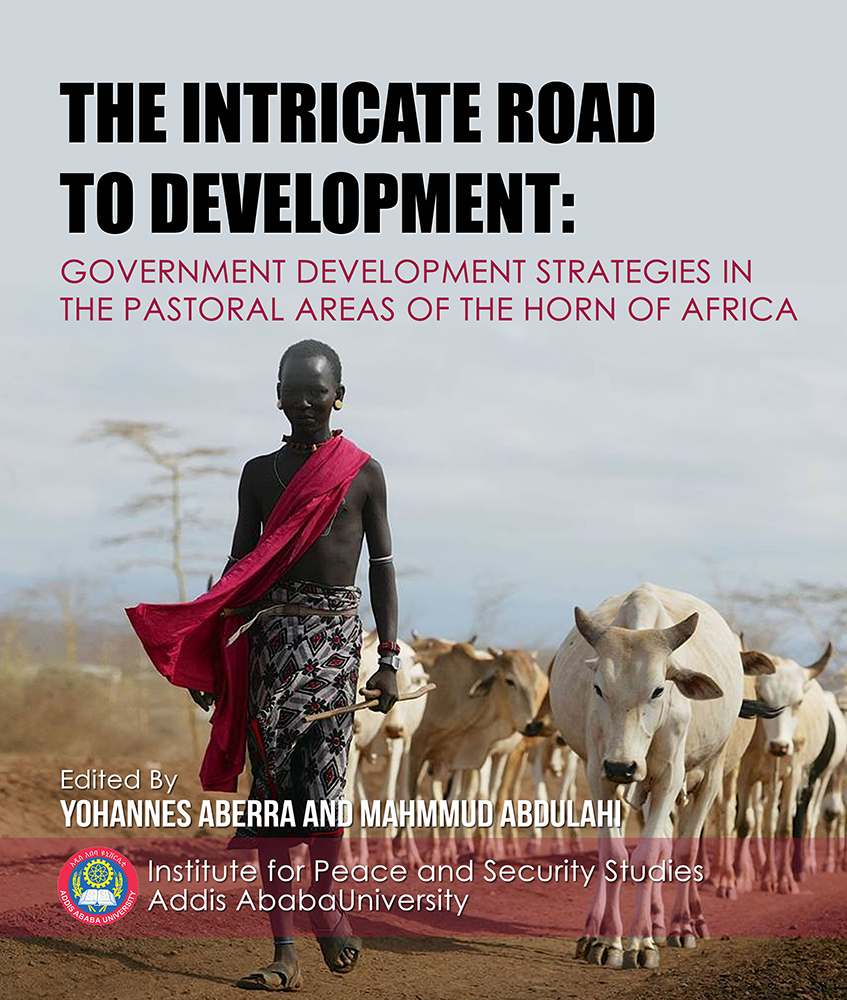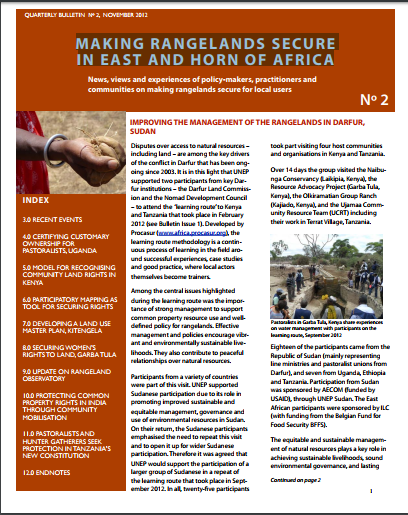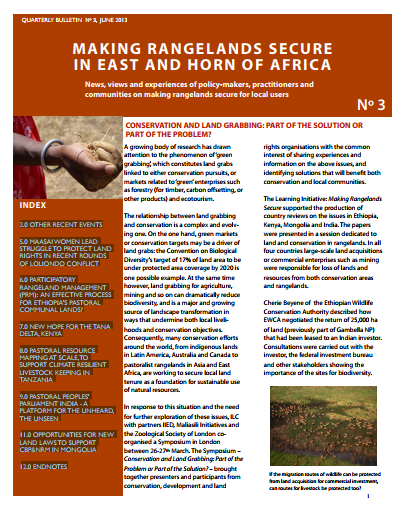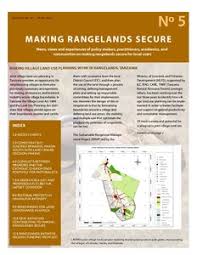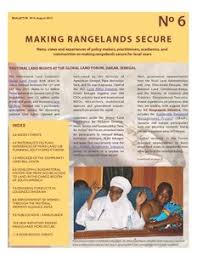The intricate road to development:government development strategies in the pastoral areas of the Horn of Africa
Pastoralism is a livelihood strategy and a system of mobile livestock production that makes wide-ranging use of grazing lands in arid and semi-arid environment that doesn’t uphold sustainable crop cultivation. The freedom of mobility over outsized land for seasonal pastures is indispensable to pastoralist production primarily in order to convert the pastures residues into human food. The people and livestock in pastoral communities may move to avoid various natural and/or social hazards, to avert competition with others, or to seek more favourable conditions.
MAKING R ANGEL ANDS SECURE IN EAST AND HORN OF AFRICA
INDEX 3.0 RECENT EVENTS 4.0 CERTIFYING CUSTOMARY OWNERSHIP FOR PASTORALISTS, UGANDA 5.0 MODEL FOR RECOGNISING COMMUNITY LAND RIGHTS IN KENYA 6.0 PARTICIPATORY MAPPING AS TOOL FOR SECURING RIGHTS 7.0 DEVELOPING A LAND USE MASTER PLAN, KITENGELA 8.0 SECURING WOMEN’S RIGHTS TO LAND, GARBA TULA 9.0 UPDATE ON RANGELAND OBSERVATORY 10.0 PROTECTING COMMON PROPERTY RIGHTS IN INDIA THROUGH COMMUNITY MOBILISATION 11.0 PASTORALISTS AND HUNTER GATHERERS SEEK PROTECTION IN TANZANIA’S NEW CONSTITUTION 12.0 ENDNOTES
CONSERVATION AND LAND GRABBING: PART OF THE SOLUTION OR PART OF THE PROBLEM?
2.0 OTHER RECENT EVENTS 5.0 MAASAI WOMEN LEAD STRUGGLE TO PROTECT LAND RIGHTS IN RECENT ROUNDS OF LOLIONDO CONFLICT 6.0 PARTICIPATORY RANGELAND MANAGEMENT (PRM): AN EFFECTIVE PROCESS FOR ETHIOPIA’S PASTORAL COMMUNAL LANDS? 7.0 NEW HOPE FOR THE TANA DELTA, KENYA 8.0 PASTORAL RESOURCE MAPPING AT SCALE,TO SUPPORT CLIMATE RESILIENT LIVESTOCK KEEPING IN TANZANIA 9.0 PASTORAL PEOPLES’ PARLIAMENT INDIA - A PLATFORM FOR THE UNHEARD, THE UNSEEN 11.0 OPPORTUNITIES FOR NEW LAND LAWS TO SUPPORT CBP&NRM IN MONGOLIA 12.0 ENDNOTES
Transformation of the learning initiative Making Rangelands Secure
2.0 RECENT EVENTS 5.0 UGANDA GAZETTES A NATIONAL LAND POLICY 6.0 PLAYING THE “CONSERVATION CARD’: THE KHWE SAN IN NAMIBIA’S BWABWATA NATIONAL PARK 7.0 SECURING LAND TITLES FOR PASTORALIST WOMEN: THE STORY OF SAKALA 8.0 PROTESTS AGAINST CONVERSION OF PASTORAL LANDS INTENSIFY IN INDIA 9.0 PASTURE PROTECTOIN IN ADILA LOCALITY, DARFUR, SUDAN 10.0 VICTORIOUS IN TANZANIA 11.0 MORE RECENT EVENTS 12.0 18,000 CATTLE GIVEN PASSAGE ACROSS AUSTRALIA
MAKING VILLAGE LAND USE PLANNING WORK IN RANGELANDS, TANZANIA
INDEX 3.0 RECENT EVENTS 5.0 COMPETENT BUT IGNORED: BRINGING MAASAI YOUTH INTO LAND TENURE DECISION MAKING 6.0 CONFLICTS BETWEEN MBORORO AND THE CATHOLIC CHURCH ENDS POSITIVELY FOR PASTORALISTS 7.0 A VISION FOR A JUST AND PROSPEROUS FUTURE? THE LAPSSET CORRIDOR 8.0 PASTORAL PROTESTS IN HANSALPUR INTENSIFY 9.0 BENCHMARKS FOR LAND GOVERNANCE IN AFRICA 10.0 NEW INITIATIVES CONTRIBUTING TO MAKING RANGELANDS SECURE 12.0 RANGELANDS INITIATIVE RECEIVES FUNDING FROM SDC
PASTORAL LAND RIGHTS AT THE GLOBAL LAND FORUM, DAKAR, SENEGAL
INDEX 2.0 RECENT EVENTS 4.0 PASTORALISTS DO PLAN! EXPERIENCES OF MURSI LAND USE PLANNING, SOUTH OMO ETHIOPIA 5.0 PROGRESS OF THE COMMUNITY LAND BILL, KENYA 6.0 DEVELOPING SILVOPASTORAL SYSTEMS FOR MORE SECURE ACCESS TO LAND IN THE CHACO REGION OF SOUTH AMERICA 7.0 ONGOING CONFLICTS IN LOLIONDO, TANZANIA 8.0 EMPOWERMENT OF WOMEN THROUGH THE PASTORAL WOMEN’S ALLIANCE, INDIA 9.0 PUBLICATIONS - RANGELANDS 10.0 NEW INITIATIVES MAKING RANGELANDS MORE SECURE 11.0 MORE RECENT EVENTS
LEARNING ROUTE: NAIROBI TO ARUSHA, FEBRUARY 2012
INDEX 2.0 RECENT EVENTS 3.0 PROTECTING LIVESTOCK MOBILITY ROUTES: LESSONS LEARNED 4.0 KENYA’S CONSTITUTION 2010 What will it mean for tenure security in rangelands? ‘Equal rights for women’ say Maasai elders 5.0 CAN VILLAGE LAND USE PLANNING WORK FOR RANGELANDS? 6.0 PROTECTING RIGHTS OF HUNTER-GATHERERS IN TANZANIA 7.0 OTHER NEWS FROM THE REGION Improving rangeland quality through land use planning Developing policies in Uganda 8.0 LAUNCH OF RANGELAND OBSERVATORY
WASTED LIVES: A Critical Analysis of China’s Campaign to End Tibetan Pastoral Lifeways
This report is an extended analytical essay, on the perverse outcomes of statist interventions into customary land management practices over a huge area that has been managed sustainably and productively by Tibetan pastoralists for 9000 years. Building on the many reports on sedentarisation, and removal of pastoral nomads from their pastures, this report takes a wider perspective, seeking to understand how the current collapse of the pastoral mode of production came about, and what the future prospects are for the depopulating pastoral landscapes of the Tibetan Plateau.
Pastoralism and Land-Tenure Change in Kenya: The Failure of Customary Institutions
Until recently, the Pokot in the highlands of the Baringo area in Kenya have practised semi-nomadic pastoralism. Today they are rapidly sedentarizing and in many areas suitable for farming, they are adopting rain-fed agriculture. As a result of these dynamics, claims to individual property on de facto communal rangelands have arisen, and to such an extent that they seriously threaten the peace of the community. This article explores the conflicts that emerge in the transition from common property to private tenure.
Rangelands Initiative
The goal of the Rangelands Initiative is increased tenure security of local rangeland users through improved implementation of enabling policy and legislation. By connecting, mobilising and influencing, the Initiative strengthens ILC members’ activities in-country and across its continental platforms.
Nomadic Custodians: A Case for Securing Pastoralist Land Rights
As part of the Global Call to Action in Indigenous and Community Land Rights, this brief puts the spotlight on the need to secure land rights for the world's pastoralists, as pastoralism is practised by an estimated 200-500 million people. Pastoralists manage rangelands that cover a quarter of the world's land surface but have few advocates.
"Pastoralists have been widely accused of being economically inefficient and turning their ‘over-grazed’ pastures into deserts. But these presumptions are not based on evidence and are usually very wide of the mark."


